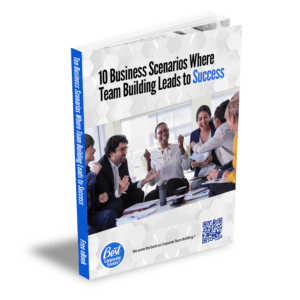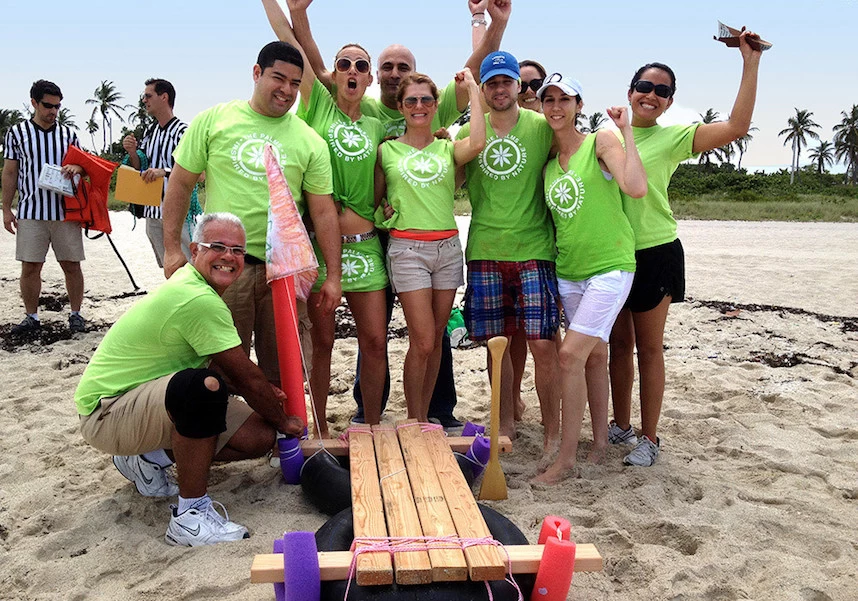Ask anyone who works in quality control about the most important element of operations and they’ll say it’s using a consistent process. In planning a team building event, as in manufacturing, doing the right things, the right way, in the right order, will consistently produce high-quality results.
Based on delivering thousands of team building programs since 2010, we’ve developed a seven (or if customization is needed, eight) step process for team building event planning that will help planners with any level of experience to consistently plan successful, effective events.
1. Establish Your Goals
As the Chesire Cat from Alice in Wonderland said, “If you don’t know where you’re going, any road will take you there.” The first, vital step in team building event planning is to figure out where you want to go, that is, what specific objective(s) you are hoping to accomplish.
Perhaps you want to bring employees together after a major organizational change, like a merger or restructuring. Or maybe your goal is to more tightly integrate remote work teams, or improve cross-functional trust and collaboration, or foster greater creativity and innovation. There are many business scenarios where team building helps lead to success.
Starting with a clear goal in mind will enable you to choose (and possibly even customize) an ideal program, select the right meeting space, and make other decisions consistent with achieving that objective.
2. Research Team Building Programs Online
Once you’ve defined your goal(s), planning a successful team building event begins with choosing the right activity.
Your team building provider’s website should provide you with all of the information you need in order to create a short list of programs that fit with your goal(s) for the event and more, including:
Experience
How long has the company been doing this? When planning a team building event, particularly for a large group, the best and safest choice is to go with a company that’s delivered thousands of programs over a decade or more.
Number and variety of programs
To be able to best meet your specific goals, the provider should offer not only a large number of different programs to choose from, but also a variety of different types of activities like game shows, corporate scavenger hunts, charitable corporate social responsibility (CSR) activities, escape rooms, and professional development workshops.
Detailed program Information
The provider’s website should present detailed information about each program, giving you a “you are there” feeling. This should include program descriptions, photos, video, event details (time required, supported group size, elements included, etc.), and client comments about each program.
Social proof
The website should make you feel comfortable and confident working with this provider by showcasing information such as awards and recognition the company has received; customer testimonials and a high TrustPilot rating; industry involvement in terms of association membership; and brand-name customer logos.
Flexibility
Just as the provider should offer a large number and variety of unique, trademarked programs, it should be flexible in terms of:
- Geography (able to deliver programs anywhere in the U.S.);
- Venue space (indoor or outdoor);
- Format (in-person or virtual); and
- Group size. While most providers are geared to handle a range of group sizes, some are ideal for small groups of a dozen or fewer participants, while others have the capability and experience to work with very large groups into the thousands.
Thought leadership
Most team building provider websites will include a blog. What kind of topics do they address? Are their posts primarily tactical (e.g., fun holiday activities, resume tips, workplace snacks) or do they address serious business challenges like how to improve team cohesion and how to address unhappiness in the workplace?
Your team building partner’s website should inspire trust as well as make it easy to select suitable programs to meet your goals. Any provider’s site that doesn’t meet the criteria above is a waving red flag that the company may not belong on your short list.
3. Work with Knowledgeable Program Advisors
In selecting a team building provider to work with, your first points of contact there (the sales team, a.k.a. program advisors) should, first and foremost, be great listeners. Talking to them should give you a high level of comfort and confidence regarding the experience, expertise, and professionalism of the company.
Program advisors should ask not only the obvious questions about timing, group size, and venue, but also insightful questions about your objectives and details you may not have considered.
Once the advisor understands the composition of your group, how much time you have allotted for the activity, and your team building goals, they should be able to suggest a few different options for specific programs that align with what you hope to accomplish, and explain how each one can help achieve your goals.
Though the program advisor will remain involved throughout the process of planning and delivering your team building event, their most active phase ends once they’ve earned the right to send you a proposal. If you accept, the advisor will then introduce you to your program manager.
4. Continue Planning Your Team Building Event with an Expert Program Manager
While a program advisor acts in a sales and expert advisory role, a program manager is focused on delivering a great experience. Once the program advisor hands off all of the information collected to the program manager, that person asks additional, deeper questions about details like the layout of the venue, the arrangement and type of tables and chairs, what floor the conference room is on, parking, and more.
For example, in our Bridge to the Future program, each team designs and constructs a bridge section which may be 10 feet or more in length, and all of the sections are connected in the end, resulting in a bridge that may be 50 feet or more in length. The event space will need to accommodate this.
If the space for that event is on one of the upper floors of the hotel, how will the materials be transported—is there a freight elevator available? How large is it? Will you have exclusive use of it during the program time or need to share it with other users? Time will also need to be allotted for disassembly of the bridge sections after the event and transport back out of the venue.
Or consider another example, a large Build-a-Wheelchair® CSR program to benefit a local nonprofit. If delivering the program will require multiple facilitators, the program manager will need to understand details about parking availability and cost. They’ll also need to verify exactly where the truck needs to dock to deliver the wheelchair kits and tools, and how the finished wheelchairs will be transported to the recipient nonprofit.
As Roy Charette, a leader in the fields of team building and professional development training and managing partner at Best Corporate Events, notes, “The program manager has a very detailed list of questions that are designed to get the facilitator to arrive and have everything ready to go from start to finish, to the best of our ability. There are always curve balls. But we want to mitigate as many of these potential issues as possible, through this great work done by the program manager.”
(Optional) Work with an Experienced Program Designer to Customize Your Activity
In most cases, team building programs can be delivered in a standard way or with minimal customization—such as adjusting the program or setup to accommodate a shorter-than-usual timeframe, adapt the activity for a limited or unusual space, or adding a few client-specific questions to a trivia game.
But once in a while, because of the specific needs and goals you have in planning a team building event, you may need a program to be more heavily customized. As we explained in our post here on the value of needs assessment and program customization:
“The third level (of program customization) involves the most extensive customization. In professional development programs such as Competition to Collaboration®, the DiSC Profile Workshop, or Igniting Team Performance, success isn’t based on a winning score. It’s what the participants walk away with—the knowledge they have gained and the ideas they can apply in the workplace to improve collaboration and productivity—that really matters.”
That’s where a program designer comes in. This individual works directly with you as the client to customize program content, questions, and other elements of the activity to deliver the experience and outcomes you are looking for.
5. Get Easy Online Access to All Event Details
Once your event is scheduled, your team building partner should be able to give you access to an online client portal where you can track all vital information related to your program, including:
- Program description with video
- Key contacts
- Event location with map
- Weather forecast for the event date
- Shipping information (e.g., for kits and supplies for CSR programs)
- Event-related documents
The portal helps keep everyone involved in producing and delivering the event informed and in sync.
6. Collaborate with Expert Facilitators
Any competent team building facilitator can deliver a program, taking participants from the introduction of the activity through the wrap-up at the end. But the best facilitators can do more than that.
They come prepared. Expert facilitators familiarize themselves with the event space, parking details, any items they may need to bring, any specifics they need to know about the group they will be working with, and other details one would only think about after years of experience.
They have command of the room. The best facilitators have empathy, charisma, and a sense of humor. They know how to get the attention of the group and get participants excited to be part of the event. They also know when to step back and let the teams collaborate, inserting themselves into the action only to acknowledge and encourage specific behaviors.
They’ve seen it all, and know how to adjust on the fly. For example: a program is set up to run for 90 minutes. Due to circumstances beyond the facilitator’s control, the activity gets started 15 minutes late—and has a hard stop time. The best facilitators know how to adjust so they can “stick the landing,” achieving the goals set for the event even with a compressed timeframe.
Things will go wrong—with the venue, shipping, the weather, or some other element of the event. The best facilitators are adept at adapting, and have the “war stories” to tell as proof.
Finally, they are business savvy. Expert facilitators don’t simply guide a group activity, they understand the business goals behind it. That enables them to set up the activity, guide it, conclude it, and in some cases even do a debrief at the end, all in ways that help accomplish the desired business objective.
7. Look for the Resources to Create a “Wow” Experience
Work with a team building partner that can do more than simply deliver a program, one that has the expertise and resources to really create an impactful, memorable experience for your team.
For example, there are a handful of national companies that can competently manage a charitable CSR event. But the best have their own warehouse filled with kits, supplies, and tools so they can reliably ship the required inventory anywhere in the country, any time. They also have a team dedicated to initiating and maintaining relationships with national and local nonprofits across the country so that the items for donation always have a worthy cause ready to receive them.
Similarly, lots of companies can deliver in-person corporate scavenger hunts and virtual escape rooms. But the best enhance these experiences with advanced, interactive, immersive technology that takes your event to another level.
Additionally, any provider can host a trivia challenge. But the best team building partners companies bring a projected answer board with sound effects, podiums, and even an audience response polling system.
Finally, almost every company these days asks clients to rate their services. The best go further, asking for more complete feedback, both positive and negative, to support continual improvement efforts. The favorable feedback is always welcome, but so are the comments which can lead to small changes that make the next program delivered even better.
Final Thoughts on Team Building Event Planning
The key to successfully planning a team building event is to follow a consistent, proven process. Working through the seven (eight, if program customization is required) steps above will enable planners searching for an ideal team building program to organize and produce an effective and fun event.
If you’re already working with Best Corporate Events, you know that we check all the boxes. Just determine your objectives, explore the 120+ programs on our website, and reach out to one of our expert program advisors. Your previous event history as well as all vital details for your upcoming event will be accessible in your client portal.
Ready to plan a great team building event? Contact us today to learn more about what we offer and to get started.






